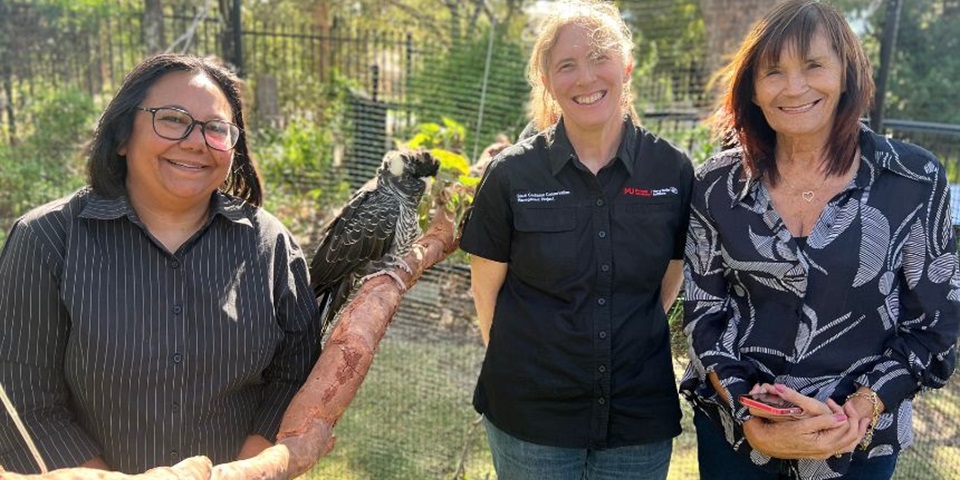News
Community action project to save endangered black cockatoos

Ngoolarks, or Carnaby's cockatoos, have connected Noongar families for thousands of years, but with human pressures, we are in danger of losing them forever.
With support from Lotterywest, Murdoch University has today launched a community empowerment program that will see researchers, Aboriginal organisations, local governments, and conservation groups take action together to protect the endangered birds.
In conjunction with Murdoch’s Harry Butler Institute and Ngangk Yira Institute for Change, the Keep Carnaby’s Flying – Ngoolarks Forever project has partnered with the Winjan Bindjareb Boodja Rangers, BirdLife Australia, Perth NRM, South East Regional Centre for Urban Landcare (SERCUL), Peel-Harvey Catchment Council, Landcare Serpentine-Jarrahdale, Urban Bushland Council of WA, Kaarakin Black Cockatoo Conservation Centre, and Curtin University’s Trace and Environmental DNA Laboratory.
The project is also collaborating with Perth Zoo and the Department of Biodiversity, Conservation and Attractions, and the Town of Victoria Park.
Working with four local governments each year, the project will support community-led on-ground activities including revegetation of black cockatoo habitat and installation of water drinking stations, while developing black cockatoo Conservation Action Plans for councils to safeguard their black cockatoo flocks in the long term.
The first four councils to engage in the project are the City of Cockburn, City of Melville, City of Wanneroo, and Shire of Serpentine-Jarrahdale.
Project lead Professor Kris Warren from Murdoch’s School of Veterinary Medicine and Harry Butler Institute said the aim was to provide simple, effective ways for communities to support the survival of the birds, which are in danger of extinction within decades.
“A major threat to Ngoolarks is the clearing of their foraging habitat, including in the Perth-Peel region,” Professor Warren said.
“Without more food, we are watching them slip into extinction”.
One of the project’s activities involves installing signs at native plant nurseries around Perth, to encourage gardeners to plant cockatoo-friendly native plant species such as banksia, hakea, and marri, and non-native, high-energy macadamia trees, which can provide food for Ngoolarks in the short-term as native plants establish.
Nursery staff will also provide advice to gardeners, and the project’s website keepcarnabysflying.org.au has detailed information about what to plant, and what else people can do to help keep Perth’s Carnaby’s cockatoos flying.
Renowned botanist and Lotterywest board member Professor Kingsley Dixon said Carnaby’s cockatoos are now so desperate for food they are eating themselves out of house and home.
“We need to revegetate with native species, but also provide fast-growing food that has a high calorific and nutritional value like macadamias or almonds as they are a quick maturing and useful early summer food source,” he said.
The project’s Cultural Engagement lead Barb Hostalek said Australian First Nations people have a deep respect and understanding for the complex interrelationships between land, sky, and water, and the preservation of all life.
“Noongar people have watched the movement of the birds with the changing seasons, for generations their unmistakable call signalling the onset of rain on Noongar boodjar,” she said.
Professor Warren said connection with Noongar Elders and Traditional Custodians was vital to the success of the project.
“Holistic community action can help save Perth’s black cockatoos, by working together we can make a tangible difference,” she said.
The Keep Carnaby’s Flying – Ngoolarks Forever project is collaborating with the following native plant nurseries:
The project has also received support from the following members of the Parliament of Western Australian for the development of educational resource materials which will be available on the website:
Kim Giddens MLA, Member for Bateman
Cassie Rowe MLA, Member for Belmont
Stephen Pratt MLC, Member for South Metropolitan Region
Peter Tinley AM MLA, Member for Willagee
Lisa O’Malley MLA, Member for Bicton
Sabine Winton MLA, Member for Wanneroo
Ayor Makour Chout MLC, Member for North Metropolitan Region
News
Community action project to save endangered black cockatoos
Posted on
Topics